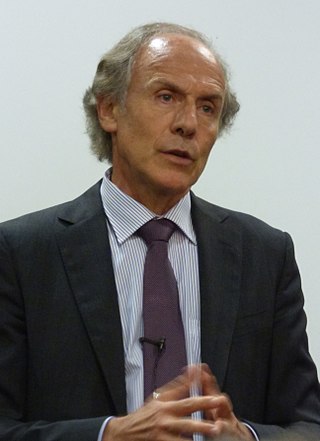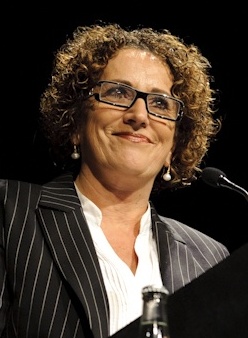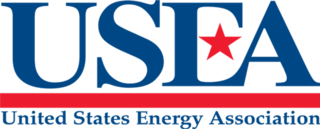
The American Public Transportation Association (APTA) is a nonprofit group of approximately 1,500 public and private sector member organizations that promotes and advocates for the interests of the public transportation industry in the United States.

The Australian Chamber of Commerce and Industry (ACCI) is Australia's largest and most representative business association, comprising state and territory chambers of commerce and national industry associations. ACCI represents Australian businesses of all shapes and sizes, across all sectors of the economy, and from every corner of the country.

Allan James Asher is an Australian lawyer, consumer advocate and campaigner.
The Australia Institute is a public policy think tank based in Canberra, Australia. Since its launch in 1994, it has carried out research on a broad range of economic, social, and environmental issues.

The Victorian Chamber of Commerce and Industry is the largest and most influential not-for-profit business organisation in Victoria, informing and supporting 47,000 members and clients across the state. Founded in 1851 with headquarters in Melbourne, the influential employer group is focused on leading business into the future by providing policy leadership, information, representation, training and networking opportunities.

Alan Simon Finkel is an Australian neuroscientist, inventor, researcher, entrepreneur, educator, policy advisor, and philanthropist. He was Australia’s Chief Scientist from 2016 to 2020. Prior to his appointment, his career included Chancellor of Monash University, President of the Australian Academy of Technology and Engineering (ATSE), and CEO and founder of Axon Instruments, and CTO for the electric car start-up Better Place Australia.

Engineers Australia (EA), known formally as the Institution of Engineers, Australia, is an Australian professional body and not-for-profit organisation whose purpose is to advance the science and practice of engineering for the benefit of the community. Engineers Australia is Australia's recognized organization for accreditation of professional engineering qualifications under the Washington Accord. As of 2022, EA has 115,000 members, which includes 31,000 students.

Energy in Australia is the production in Australia of energy and electricity, for consumption or export. Energy policy of Australia describes the politics of Australia as it relates to energy.

Frank Nnaemeka Nweke Jr is a Nigerian Politician, Entrepreneur, Teacher and Social Innovator. He is a two-time Federal Minister in Nigeria and former Director General, Nigerian Economic Summit Group (NESG). He is currently a member of the All Progressives Grand Alliance (APGA) and vied for the position of Governor of Enugu in the 2023 Nigerian General Election, upon emerging the party candidate at the primary election in May 2022.

Mark Cutifani is an Australian businessman and current chairman of the energy transition metals board at Vale Base Metals. He is the Senior Independent Director with Laing O'Rourke and chairs the board's Sustainability Committee. He is also a non-executive director of Total S.A and chairs the board's Sustainability Committee.
The Australian Pipelines and Gas Association (APGA) is an Australian industry association representing Australia’s high-pressure transmission pipeline sector, with a principal focus on long-distance oil and gas transmission, but also including transportation of other products such as water, slurry and carbon dioxide.

Paul Sinclair Heithersay is a public servant employed by the Government of South Australia. He is the chief executive of the Department for Energy and Mining. He was appointed to this role by the then recently elected Liberal government in June 2018.
UCL Australia was an international campus of the University College London, located on Victoria Square in Adelaide, South Australia. It had three parts: the School of Energy and Resources (SERAus), the International Energy Policy Institute (IEPI) and a branch of UCL's Mullard Space Science Laboratory. UCL Australia described its university community as "welcoming, dynamic and influential." The campus closed in December 2017.

Helen Veronica Szoke is the former chief executive of Oxfam Australia, and a commentator and advocate on issues of human rights, poverty, inequality, gender and race discrimination. Throughout her career, she has held leadership roles across the health sector, human rights and public policy, and international development sector.

The United States Energy Association (USEA) is an association of public and private energy-related organizations, corporations, nonprofits, educational institutions, think tanks and government agencies. USEA works with the U. S. Department of Energy, U.S. Department of State and the U.S. Agency for International Development (USAID) to make energy accessible throughout the world by focusing on the viability of electricity, coal, oil, gas, nuclear and renewables. The organization also serves as a resource for the domestic and global energy industry, hosting a variety of events year-round that inform on current energy policy, challenges and technologies. Through its member organizations, USEA shares energy best practices, executes projects, and coordinates research domestically and internationally.
Trevor Charles St Baker is an Australian businessperson with interests in power station and fuel supply development. He is director of the St Baker Energy Trust and chair of Sunset Power International. He is founder and deputy chair of ERM Power Limited.
National Energy Guarantee (NEG) was an energy policy proposed by the Turnbull government in late 2017 to deal with rising energy prices in Australia and lack of clarity for energy companies to invest in energy infrastructure. The policy specifically targets energy companies in the National Electricity Market and large energy users to have a reliability obligation as well as emissions reduction obligations.
Robert L. Pritchard is a Sydney-based lawyer active in the energy and resources sector. He is managing director of ResourcesLaw International and executive director of the Energy Policy Institute of Australia.

Thailand Textile Institute is a not-for-profit entity under the Foundation for Industrial Development (FID), which itself falls under the Ministry of Industry (Thailand).
Kerri Gaye Hartland is the Director-General of the Australian Secret Intelligence Service (ASIS). She was formerly an Australian public servant for 30 years, before joining the private sector. She was the first female deputy director-general of Australian Security Intelligence Organisation (ASIO) and took up the position of secretary of the Australian Government Department of Employment, Skills, Small and Family Business in January 2017.












